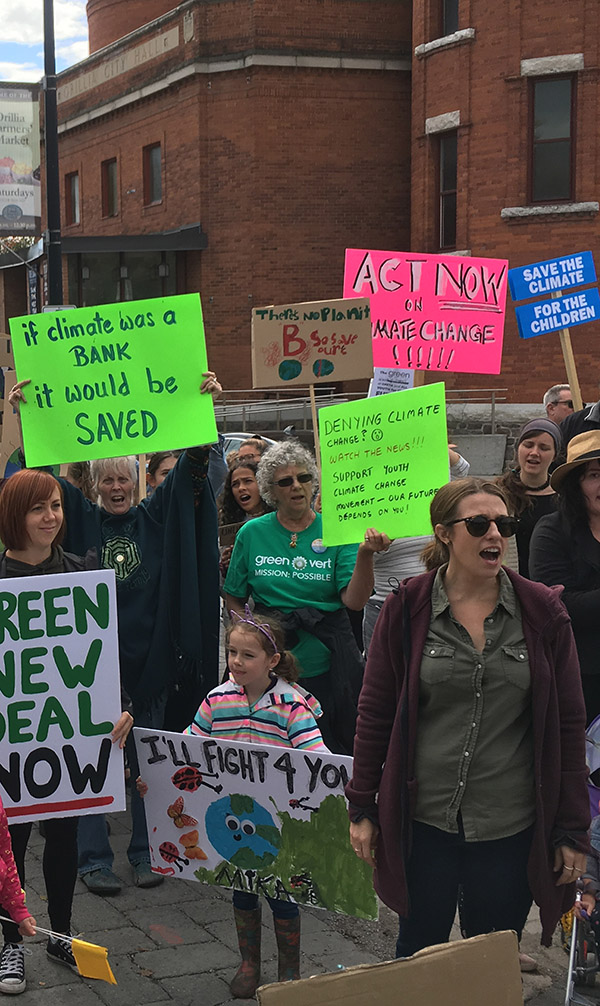Who We Are
A "made-in-Orillia" grass roots movement.
"There are no passengers on spaceship earth. We are all crew." - Marshall McLuhan
Background


Why Sustainable Orillia
Our Purpose
Mobilize participation in the creation of a more sustainable future for present and future residents of our community.
Our Vision
Our community is achieving long term sustainability through the principle.
Our Values
- Integrity
- Being honest
- Gathering and Disseminating evidence-based information
- Walking our talk
- Partnerships
- Sharing risk, reward and accountability
- Collaboration
- Encouraging participation within our community
- Embracing diversity of views toward our common purpose
- Respectfulness
- Being open to others’ views
- Being an active listener
- Fostering a safe, secure and inclusive working environment
- Being Impartial and just without favouritism or discrimination
- Accountability, Transparency and Good Governance
- We measure, monitor and report
- We are open and honest with each other, members, supporters and sponsors
- We demonstrate fiduciary duty
Our Guiding Principles
- Sustainability
- Sustainability means meeting our own needs without compromising the ability of future generations to meet their own needs and doing so in an intrinsically holistic and interdisciplinary fashion. Our needs include natural resources (natural capital), social structures, social equity, culture (social capital) and economic development and resources (economic capital).
Social Justice
Sustainable Orillia believes in the equal access of individuals to wealth, opportunities, and privileges within our community including equal access to the processes within our community that defines our present as well as our future.
Economic Justice
Sustainable Orillia subscribes to the view that the economy will be more successful if it is fair. The economy of our community should create opportunities for all in concert with our environment and not in opposition to it. IT is the belief that our economy needs to create opportunities for every person in order to have a dignified, productive, healthy and creative lifestyle in concert with nature. It means, for example, striving to attract green jobs that pay a good wage.
Environmental Justice
Sustainable Orillia views environmental justice in terms of affirming the intrinsic value of nature and the need to protect against ecological destruction. Sustainable Orillia recognizes the interdependence of nature, the economy and society. It is imperative that nature has a voice in any discussion on how community evolves in the future.

Sustainability Outcomes and Strategies
Because the world’s national and state level sustainability plans are currently insufficient and inconsistent and this is a collective problem that demands collective solutions, local initiatives are necessary. Sustainable Orillia is our local response.
Definition of “Sustainability”
Sustainability needs to be defined and everyone has a different focus. We view Sustainability as a resource supply-demand issue but within a socio-economic-environmental context.
Our working definition of “sustainability” is meeting our own needs without compromising the ability of future generations to meet their own needs. Sustainability, in this sense, suggests that human communities must be designed and realigned so that humanity’s “way of life, technologies, and social institutions honour, support, and cooperate with nature’s ability to sustain life” (Capra, 1999).
Outcomes
- A more sustainable way of life that has become an integral part of our lifestyle.
- New economic opportunities
- An improved physical environment – land, water and air
- More effective food production, transport and utilization
- Improved life for all, both physical and mental
- Ensuring that the lives of our children and ensuing generations are lived in a world that is not worse than ours —in fact, preferably better
- Development of Sustainability Orillia as a learning, leadership and collaboration hub
Strategies
- Support and cooperation with City sponsored projects (Climate Change response/adaption, efficiencies, innovation, Committees of Council initiatives)
- Engagement, education and dialogue with individuals and organizations to establish interest and commitment to Sustainability
- Facilitation of community socio-enviro-economically viable sustainability projects that are characterized by:
- Local, non-partisan, cooperative action to enhance sustainability with broader impact
- Recognition that everyone is a stakeholder in their and others’ futures and all groups are welcome contributors
- Cross-sector thinking and engagement with mutually beneficial plans and actions
- A focus on measurable reductions in individual, community, city carbon footprint enabled with “smart city” technology
- Ensuring demonstrable quick wins and long term enhancements to Orillia’s Sustainability
Organizing to Achieve Enhanced Sustainability through Community Engagement
- Agriculture and Natural Capital – (growing food, diet, local sourcing, waste, supply, sharing, pollinators, carbon sinks( natural sequestering) tree planting, habitat preservation and restoration, storm water mgt, source water protection, water and land pollution( plastics, chlorides, nitrates, phosphates)
- Arts and Culture – (leadership in societal change – art, music, theatre, writing…)
- Education and Youth – (Youth Council, Informal, Formal, and Non-formal systems targeting children to seniors)
- Goods and Services – (reuse, recycling, packaging, single use plastic eco tourism, reduced carbon footprint, green marinas, carbon offsets)
- Health and Wellness – (physical, mental, emotional health, direct and indirect impact of climate change, climate action (mitigation and adaptation), children’s wellbeing – now and in the future, environmental determinants of health, the role of natural capital on human society)
- Infrastructure and Energy – (Electrification of vehicles, active transport, solar, wind, green, affordable housing, densification of development, environmental balance between development and supporting resources, eco-footprint of development, building and operations, socially responsible investment, carbon market/pricing)
